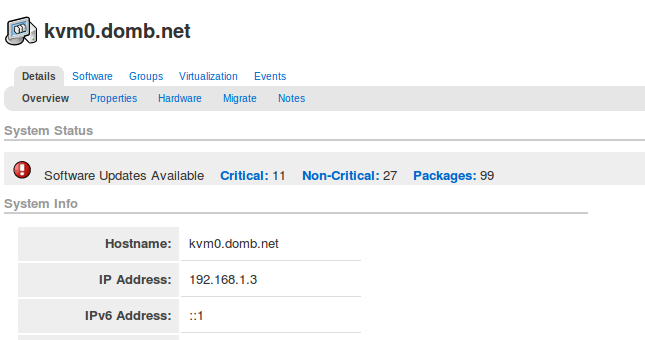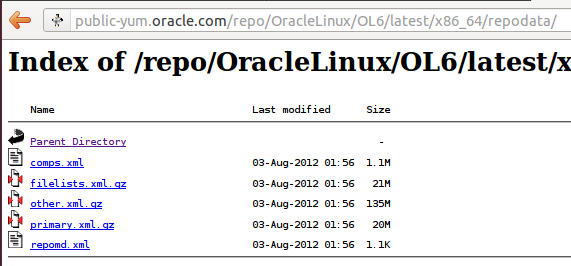Last week I came across this link: http://linux.oracle.com/switch/centos/ and thought “wow, this might be a very nice alternative to RHEL.” Here is a quote of Oracles site:
“FAQ
- Wait, doesn’t Oracle Linux cost money?
- Oracle Linux support costs money. If you just want the software, it’s 100% free. And it’s all in our yum repo at public-yum.oracle.com. Major releases, errata, the whole shebang. Free source code, free binaries, free updates, freely redistributable, free for production use. Yes, we know that this is Oracle, but it’s actually free. Seriously.“
Errata, the whole shebang, free updates? Sounds fantastic no?
The errata information in the CentOS repos are missing. There is no updatesinfo.xml.gz file which provides the essential updates and security information (as in the epel repo). As an alternative you can import the errata list into Spacewalk so you get all the information you need. Here is what I am talking about… If you execute
yum list-security on a system which has no errata (for CentOS) you get the following output:
[root@graylog2 ~]# yum list-security
Loaded plugins: fastestmirror, rhnplugin, security
There was an error communicating with RHN.
RHN Satellite or RHN Classic support will be disabled.
Error communicating with server. The message was:
Unable to connect to the host and port specified
Loading mirror speeds from cached hostfile
* base: mirror.atlanticmetro.net
* epel: mirrors.einstein.yu.edu
* extras: centos.mirror.choopa.net
* updates: mirror.trouble-free.net
FEDORA-EPEL-2012-5824 enhancement epel-release-6-7.noarch
updateinfo list done
with CentOS errata (in my case connected to my spacewalk server) it would look like this:
[root@graylog2 ~]# yum list-security
Loaded plugins: rhnplugin, security
centos6-updates-x86_64/updateinfo | 31 kB 00:00
epel/updateinfo | 427 kB 00:06
FEDORA-EPEL-2012-5715 enhancement PyYAML-3.10-3.el6.x86_64
CEBA-2012:0561 bugfix bash-4.1.2-9.el6_2.x86_64
FEDORA-EPEL-2012-6188 bugfix cobbler-2.2.3-2.el6.noarch
FEDORA-EPEL-2012-5824 enhancement epel-release-6-7.noarch
CEBA-2012:0566 bugfix glibc-2.12-1.47.el6_2.12.x86_64
CEBA-2012:0566 bugfix glibc-common-2.12-1.47.el6_2.12.x86_64
CEBA-2012:0552 bugfix irqbalance-2:0.55-30.el6_2.x86_64
FEDORA-EPEL-2012-6188 bugfix koan-2.2.3-2.el6.noarch
CESA-2012:0523 security libpng-2:1.2.49-1.el6_2.x86_64
CEBA-2012:0511 bugfix matahari-0.4.4-12.el6_2.x86_64
CEBA-2012:0555 bugfix net-tools-1.60-110.el6_2.x86_64
FEDORA-EPEL-2012-6024 bugfix perl-Config-IniFiles-2.72-2.el6.noarch
CEBA-2012:0572 bugfix qemu-img-2:0.12.1.2-2.209.el6_2.5.x86_64
CEBA-2012:0556 bugfix sos-2.2-17.el6_2.3.noarch
CEBA-2012:0565 bugfix sudo-1.7.4p5-9.el6_2.x86_64
CESA-2012:0515 security xulrunner-10.0.4-1.el6.centos.x86_64
updateinfo list done
As you can see all the CEBA and CESA show up. So lets go back to the Oracle quote, “Errata, the whole shebang!”
So I created a virtual host and ran their centos2ol.sh script. Have to say it worked flawlessly. After it ran, I begun to get a little bit excited so I ran the command again on my new OEL6 box.
[root@kvm0 ~]# yum list security
Loaded plugins: fastestmirror, security
Loading mirror speeds from cached hostfile
ol6_UEK_latest | 951 B 00:00
ol6_latest | 1.1 kB 00:00
updateinfo list done
WHAT??? really? Where is the security information (errata)? I had this host connected to my spacewalk server before and this is what it looked like:

11 Critical updates. So it seems that there are no updates or security information in the official Oracle public-yum-ol6.repo.
Lets check if the updateinfo.xml.gz is available.

So there is NO updateinfo.xml.gz file :-(.
Well Oracle, that’s disappointing. So where can I get the errata information for OEL from? Oh here it is: https://oss.oracle.com/pipermail/el-errata/. Hmm that looks like a mailing list 🙂
The El-errata Archives
You can get more information about this list.
| Archive | View by: | Downloadable version |
| August 2012: | [ Thread ] [ Subject ] [ Author ] [ Date ] | [ Gzip’d Text 2 KB ] |
| July 2012: | [ Thread ] [ Subject ] [ Author ] [ Date ] | [ Gzip’d Text 170 KB ] |
| June 2012: | [ Thread ] [ Subject ] [ Author ] [ Date ] | [ Gzip’d Text 24 KB ] |
| May 2012: | [ Thread ] [ Subject ] [ Author ] [ Date ] | [ Gzip’d Text 17 KB ] |
| April 2012: | [ Thread ] [ Subject ] [ Author ] [ Date ] | [ Gzip’d Text 17 KB ] |
| March 2012: | [ Thread ] [ Subject ] [ Author ] [ Date ] | [ Gzip’d Text 66 KB ] |
As a comparison, the CentOS one 🙂
The CentOS-announce Archives
You can get more information about this list.
| Archive | View by: | Downloadable version |
| August 2012: | [ Thread ] [ Subject ] [ Author ] [ Date ] | [ Gzip’d Text 19 KB ] |
| July 2012: | [ Thread ] [ Subject ] [ Author ] [ Date ] | [ Gzip’d Text 46 KB ] |
| June 2012: | [ Thread ] [ Subject ] [ Author ] [ Date ] | [ Gzip’d Text 41 KB ] |
| May 2012: | [ Thread ] [ Subject ] [ Author ] [ Date ] | [ Gzip’d Text 27 KB ] |
Ok, so my conclusion is yes, it’s nice the have tools like ksplice and dtrace. And depending on you’re environment, these 2 tools can make life a lot easier! But no errata information in the yum repos is a killer for me. I can have the same errata information with CentOS without being dependent on Oracle. So, I’ll wait until maybe one day, there is errata information in the oracles yum repos.
